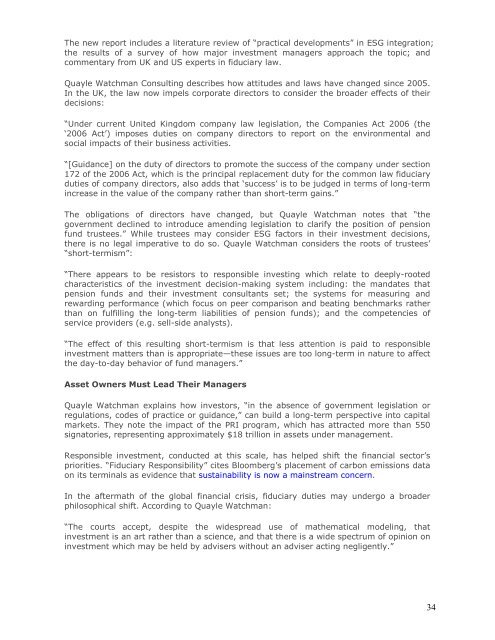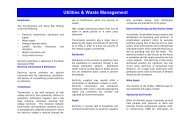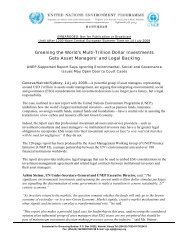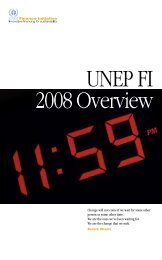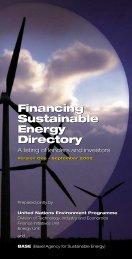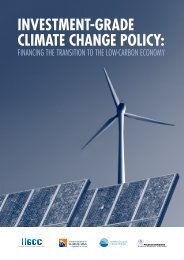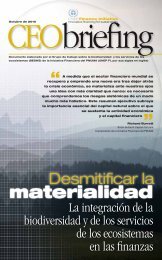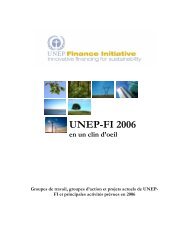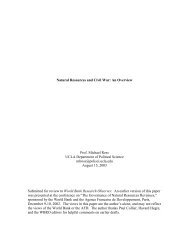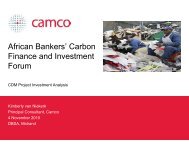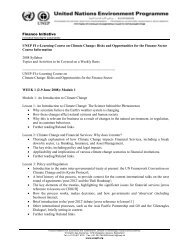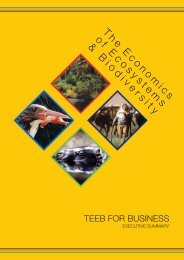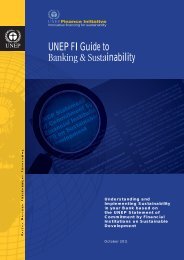UNEP FI Asset Management Working Group The - UNEP Finance ...
UNEP FI Asset Management Working Group The - UNEP Finance ...
UNEP FI Asset Management Working Group The - UNEP Finance ...
You also want an ePaper? Increase the reach of your titles
YUMPU automatically turns print PDFs into web optimized ePapers that Google loves.
<strong>The</strong> new report includes a literature review of “practical developments” in ESG integration;<br />
the results of a survey of how major investment managers approach the topic; and<br />
commentary from UK and US experts in fiduciary law.<br />
Quayle Watchman Consulting describes how attitudes and laws have changed since 2005.<br />
In the UK, the law now impels corporate directors to consider the broader effects of their<br />
decisions:<br />
“Under current United Kingdom company law legislation, the Companies Act 2006 (the<br />
‘2006 Act’) imposes duties on company directors to report on the environmental and<br />
social impacts of their business activities.<br />
“[Guidance] on the duty of directors to promote the success of the company under section<br />
172 of the 2006 Act, which is the principal replacement duty for the common law fiduciary<br />
duties of company directors, also adds that ‘success’ is to be judged in terms of long-term<br />
increase in the value of the company rather than short-term gains.”<br />
<strong>The</strong> obligations of directors have changed, but Quayle Watchman notes that “the<br />
government declined to introduce amending legislation to clarify the position of pension<br />
fund trustees.” While trustees may consider ESG factors in their investment decisions,<br />
there is no legal imperative to do so. Quayle Watchman considers the roots of trustees’<br />
“short-termism”:<br />
“<strong>The</strong>re appears to be resistors to responsible investing which relate to deeply-rooted<br />
characteristics of the investment decision-making system including: the mandates that<br />
pension funds and their investment consultants set; the systems for measuring and<br />
rewarding performance (which focus on peer comparison and beating benchmarks rather<br />
than on fulfilling the long-term liabilities of pension funds); and the competencies of<br />
service providers (e.g. sell-side analysts).<br />
“<strong>The</strong> effect of this resulting short-termism is that less attention is paid to responsible<br />
investment matters than is appropriate—these issues are too long-term in nature to affect<br />
the day-to-day behavior of fund managers.”<br />
<strong>Asset</strong> Owners Must Lead <strong>The</strong>ir Managers<br />
Quayle Watchman explains how investors, “in the absence of government legislation or<br />
regulations, codes of practice or guidance,” can build a long-term perspective into capital<br />
markets. <strong>The</strong>y note the impact of the PRI program, which has attracted more than 550<br />
signatories, representing approximately $18 trillion in assets under management.<br />
Responsible investment, conducted at this scale, has helped shift the financial sector’s<br />
priorities. “Fiduciary Responsibility” cites Bloomberg’s placement of carbon emissions data<br />
on its terminals as evidence that sustainability is now a mainstream concern.<br />
In the aftermath of the global financial crisis, fiduciary duties may undergo a broader<br />
philosophical shift. According to Quayle Watchman:<br />
“<strong>The</strong> courts accept, despite the widespread use of mathematical modeling, that<br />
investment is an art rather than a science, and that there is a wide spectrum of opinion on<br />
investment which may be held by advisers without an adviser acting negligently.”<br />
34


